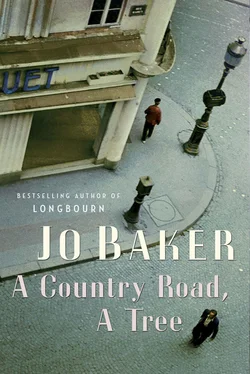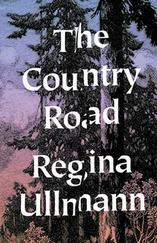As well as blood and flesh and phlegm and parasites and bacteria and shattered bone, the people bring flowers, fruit, eggs, bottles of Calvados and live chickens. They press these on the staff. Treatment is free, but there is a need to express gratitude, to offer some kind of payment. And so they give chickens, and Calvados, and fruit, and often tears.
He signs out the streptomycin, the syringes and suspensions and suture-silk and dressings and tea and cigarettes and sugar and marmalade and tinned ham. Others manage their application. He hands the packages over to the practised hands of nurses, orderlies and caterers, and ticks the items off his list, and when the new stocks arrive he shelves them, and notes them down, and hands over the receipt. What he is managing here, he likes to think, is the flow of decency. That it flows in this direction is long overdue.
Suzanne’s letter is slow in coming too, and when it arrives it is slight and strange and he reads more between the lines than is written on the paper. She thanks him for the biscuits and the coffee and the milk. She is surprised that he could so easily spare them. She wonders when he will next be in Paris. He will see how things really are for everybody there. But paper is scarce, and the sheets are small, and slight as tracing paper, and he’ll forgive her if she doesn’t squander a second sheet on this. But then she doesn’t even fill the first one.
—
He takes his turn to patrol the stores at night. For all the work that has been done to secure the place, it’s still vulnerable. And so he paces out the old vaulted attics with a flashlight, the lights left off to conserve fuel, listening to the scratch and squeak of rats in the stalls below, and the horses as they step and blow and huff, and the clatter of the generator that keeps the refrigerators humming even when the lights are out. A loaded revolver is strapped against his ribs; it lies hard and it makes his skin twitch like a horse’s. If someone breaks in, and isn’t scared off by his mere presence and a flashlight, he is expected to fire.
Between patrols, he sits under one light, his back to a tea-chest, his coat buttoned to his chin, feet drawn up towards him. He sets the gun aside. He opens a book. A quick choice from the crate supplied along with the cigarettes and whiskey, the Scrabble set and table-tennis, for the leisure hours of the Irish volunteers. He turns pages. The words skim by and do not settle. Instead, he feels the press of his own thoughts, the swell of the dark space at the back of the head from where the images start to spill. He’s lost: the broken boots, the stiffening limbs, the sun sinking, rising, sinking; a country road, a tree. This is a waterfall that he is falling with, these are dream-thoughts on the edge of sleep; they slip away and turn to mist when he looks at them directly.
A noise. His head jerks up; he sets the book aside. A thud — something fell. And then a metallic clattering, scuffling and rummaging: someone has broken into the stores. He reaches for the gun. The darkness stretches out across the countryside from here. The hospital is more than a yell away. He is all by himself with this. The scuffling continues.
He unfolds up from the floor.
All is as black as backstage; his torch picks out patches as he moves through the stores. He clicks the safety off. He must defend a million cigarettes. A ton of jam. Fifteen crates of whiskey. And sterile dressings, bottles of stinking yellow iodine, and those milky, opalescent little ampoules of penicillin, snugly packed into their boxes, the boxes stacked in their humming refrigerators. In purely utilitarian terms, penicillin, perhaps, is worth shooting someone for. His hand is sweaty — he switches the gun into his left, wipes his palm down his trouser-leg, swaps the pistol back again, fumbling the torch. He treads softly down between the crates.
He slides round the corner. A carton lies sideways on the floor, tins tumbled out, the lids burst off some of them. Something dark writhes over the pale spillage. He doesn’t fire. He reaches for the light switch, flicks it. And the rats scatter. He lets a breath go. Then he goes to fetch a dustpan and brush. He sweeps up the powdered milk that has been spilt and pours it into the bin. He rights the remaining tins and sorts through them, and puts the untainted ones back on the shelf. There is, after all, no point crying over it.
Later, the gun handed over to the next watch, he walks back to the barracks through the blue pre-dawn, smoking a cigarette, not knowing quite where to put his feet, since the path itself seems to be heaving. A whisk of tail, a dart, a flash of eye; dozens of them, scores, bold as you like. Their usual runs and haunts have been blown out of existence in the bombing; the warehouses and stables and farmyards are no longer there — and so the rats spill everywhere, and seek out new shelter and new sources of food. Just like anybody would.
To the east the sky is paling, and soon another day is going to happen to him, but first there must be sleep. He toes off his boots outside the door, carries them along the row of sleeping men. At his own bed, he flops his greatcoat across the low cross-tie of the roof. He unbuttons his tunic, steps out of his trousers, clambers into bed. He lies, blinking in the darkness, his tongue exploring the spaces in his mouth, the remaining teeth like monoliths, the smooth bald gum. Out there in the darkness there is a scratching and a scuttling, and the almost-too-high-to-hear squeaking of the rats, and something must be done about that, before they taint everything and take over the place entirely. In his mind, he assembles another package, composes another letter. He thinks, a tin of butter, a tin of ham, a tin of peaches. What else can he glean, for Mania and the boys? He blinks. He blinks. And then he’s gone.
CHAPTER TWENTY PARIS, October 1945
They’re rattling down a boulevard in a Red Cross car. He has brought a bag of pears with him from Normandy; it sits on the parcel shelf. And this, oh God, this is Paris again, look at it, and there’s money in his pocket, look, there are people on the terraces, a tram swings round the corner. He’s driving through the city. His uniform-issue boots are sound and sturdy; he has a bag full of sweet and bulging pears. The war is over and so things should be good, but there is still so much that is lacking now. And this is an uneasy anticipation, seeing her again.
He spins past the Arc de Triomphe, along the Champs-Élysées and through the Place de la Concorde, so that his passengers can see the city. The open spaces of it, spinning with bicycles, rattling with buses and even a few official cars. And, what is more — and is more striking — an absence of German Army vehicles. There are no big fair men in grey-green, no bunches of Green Beans on the terraces or clusters strolling down the streets in civvies with their cameras. This is not somebody else’s city any more. The bunkers and the checkpoints have been dismantled or turned to other use. Pigeons flutter upward. He follows their flight past a broken window patched with a board, and a spray of bullet holes in a pale stone wall. There are scars left here too. Marks of harm. His eyes follow the pigeons up into the wide clear sky.
“Watch the road, eh?”
He swerves on to the Pont de la Concorde, and they are rattling along through the Left Bank. He drops his passengers at their lodging on rue Jacob — the quiet loveliness of the rue Jacob — and then he goes — well, he goes home, he supposes. This is the nearest thing there is to home. Back through these narrower streets, where an occasional bicycle wobbles aside, and a pram is bumped up on to the pavement, and a few commercial vans are loading and unloading. And as the moment of return approaches, things slow and become thick with apprehension.
Читать дальше










